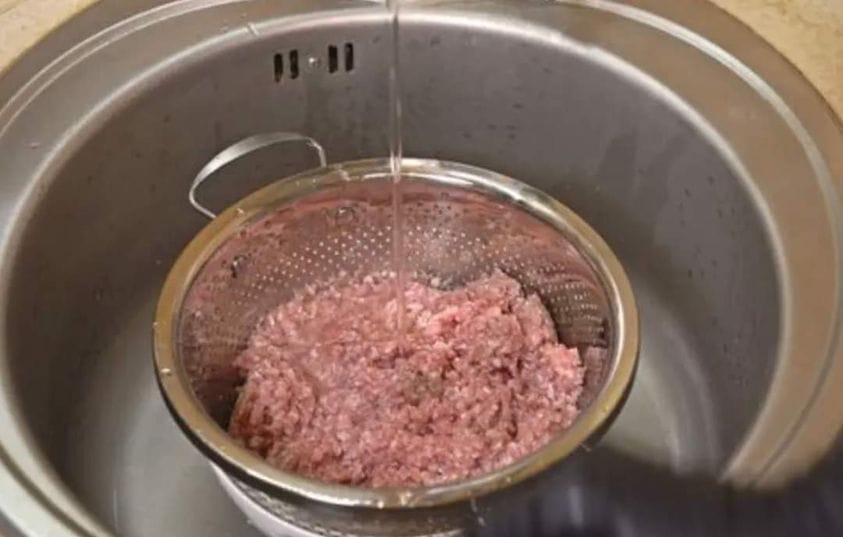When it comes to cooking ground beef, a common question often pops up: should you rinse ground beef before or after cooking? It’s a debate among home cooks with opinions that vary widely. While some argue that rinsing ground beef can be beneficial, others claim it’s unnecessary and even detrimental. Let’s dive into this culinary dilemma and explore both sides of the argument.

The Case for Rinsing Ground Beef
Some home cooks advocate for rinsing ground beef, usually to reduce fat content. For those keeping a close eye on their calorie intake or trying to cut down on greasy food, rinsing may seem like a logical step. Ground beef, especially if it’s not labeled as lean, contains a significant amount of fat. When cooked, this fat liquefies, often resulting in a greasy texture. Rinsing the meat with hot water after browning can wash away some of the excess fat, making the dish feel lighter.
The idea of rinsing ground beef is particularly appealing to those aiming for a healthier diet. With lower fat content, meals like tacos, spaghetti, or casseroles may have fewer calories. Additionally, rinsing may benefit those following certain diets, such as low-fat or heart-healthy plans.
Another reason some cooks choose to rinse ground beef is to remove the so-called “meaty” or “gamey” flavor that comes with some cuts. The belief is that a quick rinse can mellow out strong flavors, making the meat more palatable for sensitive taste buds, particularly for children or those who are not fond of the rich taste of beef.
The Argument Against Rinsing Ground Beef
On the other hand, there are plenty of cooks who strongly oppose rinsing ground beef. Their main concern is that rinsing strips away flavor along with the fat. Fat is an essential carrier of flavor, and removing it can lead to a final dish that tastes dry and bland. In many recipes, the fat rendered from cooking ground beef is an important component of the dish’s flavor and texture.
@madinahskitchen Washing ground beef #food #foodtiktok #cooking #cookingtiktok #beef #bussin ♬ Wii – Mii Channel – Super Guitar Bros
Rinsing the beef also causes a loss of moisture, which can result in a dry, crumbly texture. The fat left in the meat not only adds flavor but also keeps it moist during the cooking process. When you rinse away the fat, you’re essentially removing some of the natural juiciness that makes ground beef dishes satisfying.
Culinary experts often argue that, rather than rinsing, it’s better to opt for leaner cuts of ground beef if reducing fat is the goal. Ground beef labeled 90% lean or higher contains significantly less fat, making it a healthier option that retains flavor without the need for rinsing.
The Mess and Plumbing Concerns
Apart from the flavor debate, rinsing ground beef can create a mess in the kitchen. The process involves transferring hot meat to a colander and running hot water over it, which can lead to grease splattering around the sink. This not only creates extra cleaning work but also poses a risk of burns from the hot grease splashes.
Another issue to consider is the potential damage to your plumbing. Pouring grease or fat down the sink, even if diluted with hot water, can lead to clogs over time. As the fat cools, it solidifies and can build up in your pipes, causing poor drainage and possibly expensive repairs.
A more environmentally friendly and cost-effective method is to let the fat cool and solidify. Once it hardens, you can scrape it into a container and dispose of it in the trash. This method minimizes the risk of plumbing problems and keeps the kitchen cleaner.
A Personal Choice
Ultimately, whether or not to rinse ground beef is a personal decision. It comes down to individual preferences regarding taste, texture, and dietary needs. If you’re aiming for lower fat content and are okay with a slight reduction in flavor and moisture, rinsing might be worth considering. However, if you value a juicy, flavorful dish, you might want to skip the rinse and embrace the richness that comes from the fat.
If you do choose to rinse, consider the method carefully to minimize mess and plumbing issues. Place a colander in the sink, drain the meat, and pour hot water over it slowly to avoid splashes. Be sure to dispose of any collected fat properly, rather than pouring it down the drain.
Final Thoughts
Cooking is an art, and like any art form, it leaves room for personal interpretation. When working with ground beef, the choice to rinse or not is one of many decisions that can shape your meal’s outcome. The best approach is to consider the pros and cons and try both methods to see which one suits your taste and cooking style better.
Next time you’re preparing ground beef, remember that there’s no right or wrong answer—only what works best for you and your family. Whether you choose to rinse for a lighter dish or leave the fat for richer flavor, the key is to enjoy the process and savor the results. Bon appétit!





